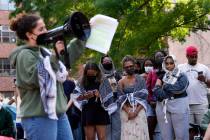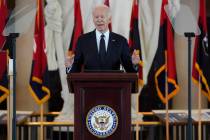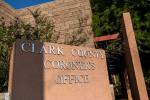Lost phone frustrates business owners; police say it’s just hiccup for crime hot line
Don Walford notices suspicious activity from time to time near his insurance office near East Charleston and 30th streets: a "flagger" directing drug seekers to a dealer down the way, or women strolling back and forth who might be practicing the world's oldest profession.
Recently, Las Vegas police resurrected the Direct Officer Access Phone, which is a program aimed at situations such as Walford's. Downtown business owners have a number they can call to report drug and prostitution problems directly to an officer.
The thing is, when Walford called, no one answered, and this week he found out why.
Someone lost the phone.
This came out at a meeting between police officials and the Downtown Business Operators Council on Wednesday.
"We couldn't believe it," Walford said. "We were like, 'C'mon! No one's going to tell us that there's no use calling?'"
Capt. Will Minor, who heads the Police Department's downtown command, said businesses were able to begin calling again as of Friday morning.
"We've got it replaced," he said. "When we couldn't locate it in any of the patrol vehicles or any of the places it was supposed to be, we went ahead and replaced it.
"At this point, we're trying to determine who was the last officer to have it," he said.
For business owners, it's a frustrating stumble for a program that was unveiled with much fanfare at the beginning of the year.
"It's a good concept. It just needs follow-through," said the Rev. Steve Smith of the Downtown Community Church.
Smith joined police officers and walked up and down Fremont Street in January to tell businesses about the revived DOAP program. He also was one of about 15 people who sat through a class on what to watch for and how to call in a useful report.
But when he saw suspicious activity near his church, "I called it several times and couldn't get an answer," Smith said.
That happened even after the Police Department contacted him to say the program was up and running.
Eventually, he stopped calling. Walford stopped, too, and instead went outside with a camera to let people know they were being watched.
That's a bad sign, said Smith, who remembers when the DOAP program was active several years ago.
"This is the second time this has fallen through the cracks," Smith said. "It falls by the wayside if someone doesn't answer the phone."
Minor said the program faded before because it got lost in the shuffle as leadership rotated in the Police Department.
There was also some abuse of the hot line because people were calling for things unrelated to drugs and prostitution, he said.
He said that the DOAP hot line is a department priority.
"We're not going to give up on it," he said. "We've just got to keep pumping at it."
Contact reporter Alan Choate at achoate @reviewjournal.com or (702) 229-6435.























